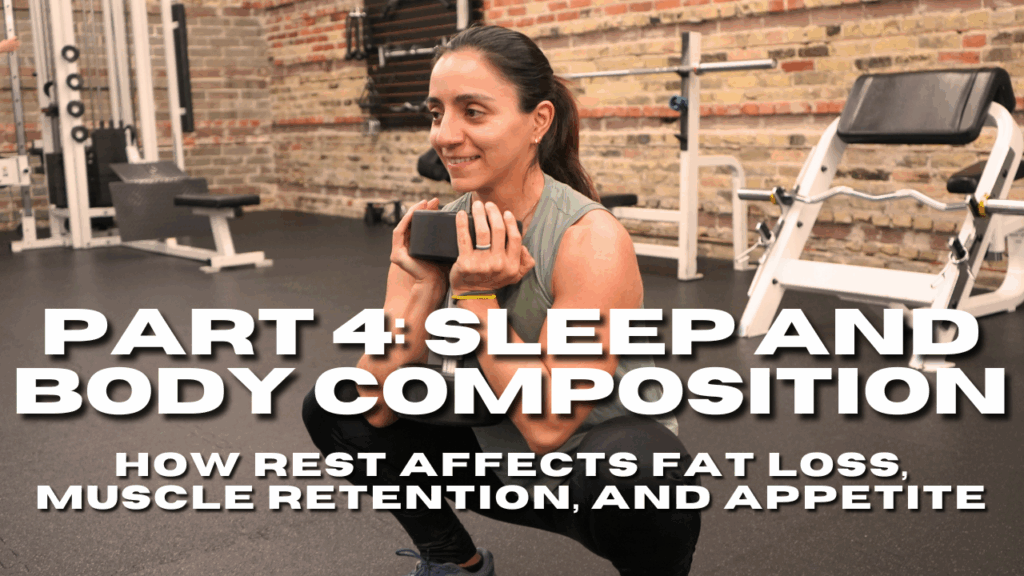
Let’s cut to it: you can train hard and eat clean, but if your sleep sucks, your body composition goals will suffer. Whether you’re aiming to lose fat, build lean muscle, or do both, sleep is the secret sauce that ties it all together. It affects how your body stores fat, retains muscle, and regulates hunger — and skimping on it can sabotage your results.
Sleep and Fat Loss: More Than Calories In vs. Out
Most people think fat loss is just about diet and exercise — and while that’s mostly true, sleep is a major player in energy regulation. In a landmark study by Nedeltcheva et al. (2010), participants on a calorie-restricted diet lost 55% less fat when they slept only 5.5 hours per night compared to those who got 8.5 hours. Worse yet? The sleep-deprived group lost more lean muscle mass instead of fat.
In short:
- Well-rested = more fat loss, more muscle retention
- Sleep-deprived = more muscle loss, more fat retention
This happens because inadequate sleep alters the way your body responds to both training and diet — skewing hormonal responses, impairing insulin sensitivity, and increasing your cravings.
Hunger Hormones: Ghrelin and Leptin
Your appetite is regulated by two key hormones:
- Ghrelin = “Go” hormone — stimulates hunger
- Leptin = “Stop” hormone — signals fullness
When you don’t sleep enough, ghrelin levels go up, leptin goes down, and your brain becomes more sensitive to food cues — especially calorie-dense, high-carb foods (Spiegel et al., 2004). That’s why after a bad night’s sleep, your meal prep doesn’t look as appealing as that drive-thru breakfast sandwich.
Combine that with reduced self-control and emotional stress, and it’s easy to see how sleep loss leads to overeating and stalled fat loss — no matter how disciplined you are the rest of the day.
Insulin Sensitivity and Fat Storage
Short sleep duration also impairs insulin sensitivity — your body’s ability to move glucose from the bloodstream into your muscles for energy. When insulin sensitivity drops, more glucose gets stored as fat rather than used for fuel.
In a study by Donga et al. (2010), just one night of partial sleep deprivation reduced insulin sensitivity by as much as 25%, comparable to early stages of metabolic syndrome. That’s a huge hit for anyone trying to manage body composition, especially if you’re already in a calorie deficit and relying on training for lean muscle preservation.
Why Muscle Retention Matters on a Cut
Even during fat loss, the goal should be to keep as much muscle as possible — because muscle:
- Supports metabolism
- Enhances aesthetics (aka, that “toned” look)
- Helps regulate glucose and fat metabolism
- Increases functional strength
Sleep is where this preservation happens. Deep sleep is the phase where muscle protein synthesis and recovery peak, and the hormones that support lean mass — testosterone, growth hormone, and IGF-1 — do their thing. Poor sleep leads to a more catabolic (muscle-wasting) internal environment, even if you’re training hard and eating well.
What the Research Says
- Nedeltcheva et al. (2010): Sleep-deprived dieters lost more lean mass and retained more fat.
- Spiegel et al. (2004): Partial sleep deprivation increased ghrelin, decreased leptin, and triggered hunger for high-calorie foods.
- Donga et al. (2010): One night of short sleep reduced insulin sensitivity by 25%.
The takeaway? Even if your training and nutrition are locked in, bad sleep will make fat loss harder and muscle loss easier.
Real Talk from the Gym Floor
If you’re dieting but not losing fat — or worse, you’re getting smaller but weaker — look beyond your macros and sets. Ask yourself:
- Are you staying up late scrolling?
- Sleeping in short chunks because of stress or work?
- Ignoring sleep to squeeze in early training sessions?
You might be breaking down muscle instead of burning fat. Recovery sleep isn’t just about energy — it’s about how your body chooses to adapt to your training and diet.
Takeaways for White Lion Strong Members
- Sleep helps preserve lean muscle and encourages fat loss during a calorie deficit.
- Aim for 7–9 hours per night, especially when cutting or prepping.
- Poor sleep disrupts hunger signals and leads to cravings.
- You can’t out-train or out-diet consistently poor sleep — long-term results depend on rest.
References
Donga, E., van Dijk, M., van Dijk, J. G., Biermasz, N. R., Lammers, G. J., van Kralingen, K. W., … & Romijn, J. A. (2010). A single night of partial sleep deprivation induces insulin resistance in multiple metabolic pathways in healthy subjects. Journal of Clinical Endocrinology & Metabolism, 95(6), 2963–2968. https://doi.org/10.1210/jc.2009-2430
Nedeltcheva, A. V., Kilkus, J. M., Imperial, J., Kasza, K., Schoeller, D. A., & Penev, P. D. (2010). Sleep curtailment is accompanied by increased intake of calories from snacks. The American Journal of Clinical Nutrition, 92(2), 361–368. https://doi.org/10.3945/ajcn.2010.29601
Spiegel, K., Tasali, E., Penev, P., & Van Cauter, E. (2004). Sleep curtailment in healthy young men is associated with decreased leptin levels, elevated ghrelin levels, and increased hunger and appetite. Annals of Internal Medicine, 141(11), 846–850. https://doi.org/10.7326/0003-4819-141-11-200412070-00008